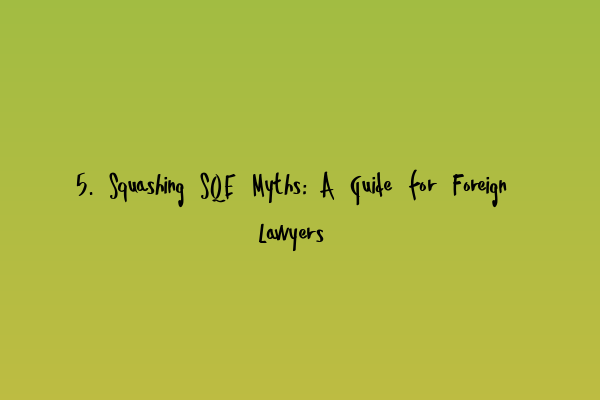5. Squashing SQE Myths: A Guide for Foreign Lawyers
Are you a foreign lawyer looking to qualify as a solicitor in England and Wales? If so, you’ve likely heard of the Solicitors Qualifying Examination (SQE) – the new assessment framework that will replace the current Qualifying Law Degree and Legal Practice Course.
While the SQE represents an exciting opportunity for foreign lawyers to enter the legal profession in the UK, there are several myths and misconceptions surrounding the examination. In this guide, we will debunk some of the most common myths about the SQE and provide you with the information you need to navigate this new examination successfully.
1. Myth: The SQE is only for UK law graduates
Fact: One of the biggest myths about the SQE is that it is only open to UK law graduates. In reality, the SQE is designed for both UK and foreign lawyers who wish to qualify as solicitors in England and Wales. Whether you have a law degree from a UK university or an international qualification, you can sit for the SQE.
However, it is essential to note that foreign lawyers may need to satisfy certain eligibility requirements, such as demonstrating their knowledge of English law and legal principles. Therefore, it is crucial to familiarize yourself with the specific requirements for foreign lawyers seeking qualification through the SQE.
2. Myth: The SQE is easier than the current route to qualification
Fact: Some people believe that the SQE will be easier than the current route to qualification. However, this is not necessarily true. The SQE is a rigorous examination designed to assess candidates’ knowledge and competence in key areas of legal practice.
While the format of the SQE differs from the traditional route, with its focus on practical skills assessments and multiple-choice questions, it is crucial for foreign lawyers to understand that the level of difficulty remains high. To succeed in the SQE, you will need to study, prepare, and familiarize yourself with the examination format.
If you’re unsure about how to tackle multiple-choice questions effectively, check out our related article on Strategies to Tackle SQE MCQs: Mastering Multiple-Choice Questions.
3. Myth: The SQE is only theoretical and lacks practical application
Fact: Another common misconception is that the SQE is purely theoretical and lacks practical application. However, this is far from true. The SQE aims to assess candidates’ ability to apply legal knowledge and skills in real-life scenarios.
To ensure you are adequately prepared for the practical aspect of the SQE, it is essential to engage in case study practice and develop your skills in analyzing and applying legal principles to realistic situations. For more information on how to excel in case studies, you can refer to our related article on SQE Case Studies: Applying Knowledge in Real-Life Scenarios.
4. Myth: Studying for the SQE is a solo journey
Fact: While studying for the SQE will require individual effort and commitment, it is not a solitary journey. Various resources, study groups, and training providers are available to support you throughout your preparation for the examination.
Engaging with a community of fellow candidates, tutors, and legal professionals can provide valuable insights, guidance, and encouragement. Don’t hesitate to seek out study partners or join discussion groups where you can learn from others who are on a similar journey.
5. Myth: The SQE is an insurmountable barrier for foreign lawyers
Fact: Some foreign lawyers may perceive the SQE as an insurmountable barrier to entering the legal profession in England and Wales. However, with the right approach and preparation, it is entirely possible to overcome this challenge and succeed in the examination.
Developing a comprehensive study plan, utilizing resources from reliable training providers, and seeking support from mentors or tutors can significantly enhance your chances of achieving a successful outcome in the SQE.
To optimize your performance and increase your chances of success in the SQE, it is essential to devise a strategic exam strategy. Our related article on SQE Exam Strategy: Planning and Executing for Optimal Performance provides valuable insights and tactics to help you plan and execute your exam strategy effectively.
In conclusion, the SQE is a promising pathway for foreign lawyers to qualify as solicitors in England and Wales. By dispelling these myths, we hope to provide you with a clearer understanding of what to expect from the SQE and how to approach your preparation.
Remember, the SQE is not an insurmountable barrier, but rather an opportunity to showcase your legal knowledge, skills, and dedication. With the right mindset, resources, and support, you can confidently navigate the SQE and achieve your goal of becoming a qualified solicitor.
If you’re interested in learning more about the SQE and proven tactics to ace the examination, check out our related article on SQE Strategies: Proven Tactics to Ace the Solicitors Qualifying Examination.
Best of luck in your SQE journey!
